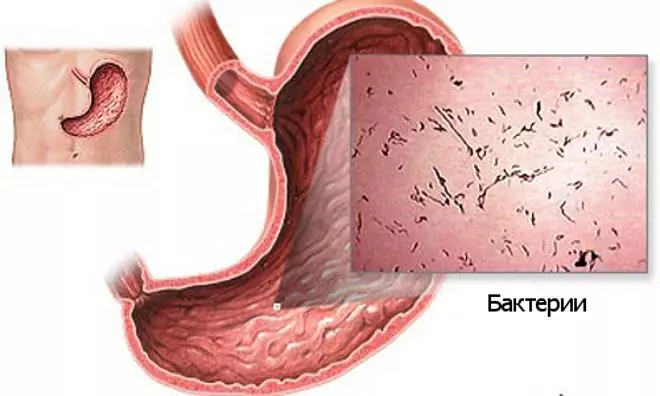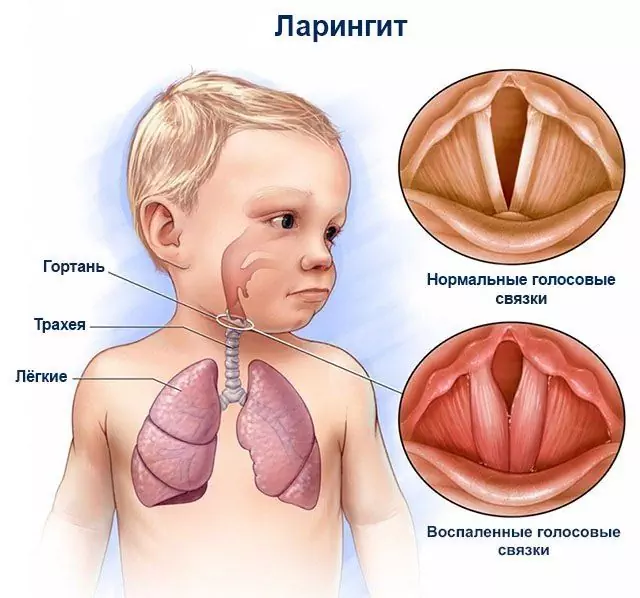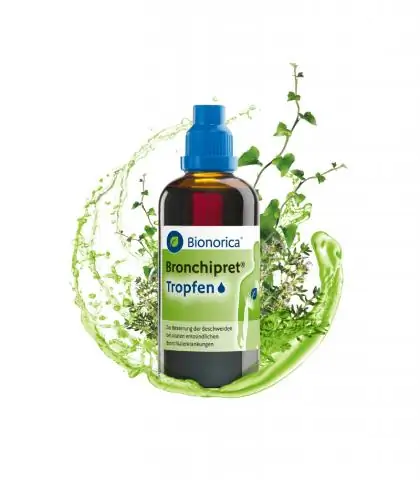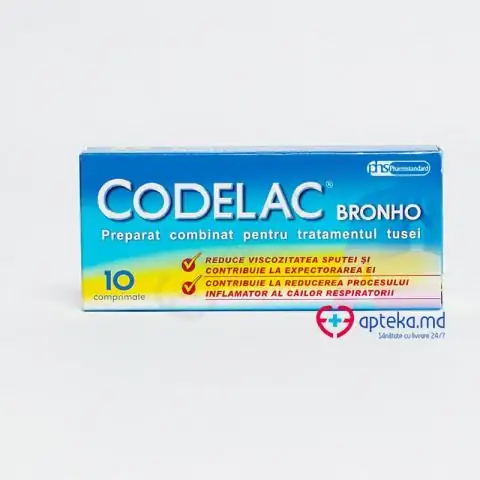- Author Rachel Wainwright wainwright@abchealthonline.com.
- Public 2023-12-15 07:39.
- Last modified 2025-11-02 20:14.
Pharmazoline
Pharmazolin: instructions for use and reviews
- 1. Release form and composition
- 2. Pharmacological properties
- 3. Indications for use
- 4. Contraindications
- 5. Method of application and dosage
- 6. Side effects
- 7. Overdose
- 8. Special instructions
- 9. Application during pregnancy and lactation
- 10. Use in childhood
- 11. Drug interactions
- 12. Analogs
- 13. Terms and conditions of storage
- 14. Terms of dispensing from pharmacies
- 15. Reviews
- 16. Price in pharmacies
Latin name: Farmazolinum
ATX code: R01AA07
Active ingredient: xylometazoline (xylometazoline)
Manufacturer: PJSC "Farmak" (Ukraine)
Description and photo update: 2018-27-11

Pharmazoline - nasal drops, have a vasoconstrictor and anti-edema effect.
Release form and composition
The drug is available in the form of nasal drops 0.05% and 0.1%: transparent colorless liquid [10 ml in polyethylene bottles (with or without opening control), in a cardboard box 1 bottle and instructions for use of Pharmazoline].
10 ml drops contain:
- active substance: xylometazoline hydrochloride - 0.005 g (0.05%) or 0.01 g (0.1%);
- auxiliary components: sodium phosphate monobasic, sodium phosphate disubstituted, sorbitol, Trilon B, decamethoxin, water for injection.
Pharmacological properties
Pharmacodynamics
Pharmazoline is a non-selective alpha-adrenergic agonist. Its mechanism of action is due to the vasoconstrictor effect of the active substance. When exposed to the nasal mucosa, xylometazoline reduces blood flow in the venous sinuses, hyperemia and exudation, providing an anti-edema effect. The therapeutic effect of Pharmazolin helps to facilitate nasal breathing, to reduce the severity of inflammation.
Pharmacokinetics
Absorption of drops after instillation occurs mainly through the mucous membranes of the nose. The drug enters the systemic circulation in a small amount. The action begins in about 1/6 hour and lasts for 5-6 hours.
Indications for use
The use of Pharmazolin in the form of a 0.05% solution is indicated for children aged 1-11 years, 0.1% for adults and children over 12 years old with the following diseases and conditions:
- swelling and hyperemia of the mucous membranes of the nose and nasopharynx of various etiologies;
- acute allergic rhinitis, hay fever;
- sinusitis, laryngitis, otitis media;
- prevention of edema during surgical or diagnostic procedures in the nasal passages.
Contraindications
- atrophic rhinitis;
- arterial hypertension;
- tachycardia;
- severe atherosclerosis;
- angle-closure glaucoma;
- hyperthyroidism;
- individual intolerance to the components of Pharmazoline.
Age contraindications:
- age up to 12 years: 0.1% solution;
- age up to 1 year: 0.05% solution.
It is not recommended to use the drug during pregnancy and breastfeeding.
Pharmazoline should be used with caution in case of coronary insufficiency, a tendency to high blood pressure, an enlarged thyroid gland, diabetes mellitus, porphyria, prostate hypertrophy, pheochromocytoma, hypersensitivity to sympathomimetics.
Pharmazolin, instructions for use: method and dosage
Drops of Pharmazolin are used by instillation into each nasal passage.
Before the procedure, you must thoroughly clean the nasal cavity.
Recommended dosage:
- drops 0.05%: children aged 1-5 years - 1-2 drops 1-2 times a day, children 6-11 years old - 2-4 drops 2-3 times a day. The duration of the course of treatment is 7 days;
- drops 0.1%: adults and children over 12 years old - 2-4 drops 3 times a day for 10 days.
For adults and children, Pharmazolin should not be instilled more than 3 times a day.
After opening the bottle, the drug is suitable for use within 28 days.
Side effects
- from the nervous system: with prolonged use of high doses - headache, dizziness, insomnia, depression, fatigue, hallucinations (more often in children);
- from the immune system: hypersensitivity reactions (including itching, skin rashes, angioedema);
- local reactions: possibly - burning, tingling, dryness in the nose and nasopharynx, with prolonged use - swelling of the nasal mucosa, nosebleeds;
- others: against the background of prolonged use of high doses - vomiting, increased blood pressure (BP), heart rhythm disturbances, palpitations, tachycardia, short-term visual impairment, convulsions (more often in children).
Overdose
Symptoms: against the background of very frequent instillation - dry nose, headache, nausea, increased blood pressure, depression, short-term visual impairment.
Treatment: in case of accidental ingestion of drops, immediate gastric lavage, laxatives and enterosorbents are required. Further - the appointment of symptomatic therapy, if necessary - alpha-blockers (phentolamine, tropafen), sympatholytics. You must stop using Pharmazoline.
special instructions
In order to prevent infection, the use of one bottle for the treatment of several persons is contraindicated.
To open the drug, it is necessary to turn the cap until it stops, which will lead to a puncture in the upper part of the bottle.
Influence on the ability to drive vehicles and complex mechanisms
The use of Pharmazoline in the recommended doses does not adversely affect the speed of the patient's psychomotor reactions.
Application during pregnancy and lactation
It is not recommended to use drops of Farmazolin during gestation and breastfeeding.
Pediatric use
The use of drops of 0.1% Pharmazoline for children under the age of 12 is contraindicated, 0.05% - up to 1 year.
Recommended dosage:
- drops 0.05%: children aged 1-5 years - 1-2 drops 1-2 times a day, children 6-11 years old - 2-4 drops 2-3 times a day. The duration of the course of treatment is 7 days;
- drops 0.1%: children over 12 years old - 2-4 drops 3 times a day for 10 days.
Drug interactions
The interaction of Pharmazoline with other drugs can occur only when it enters the circulatory system.
Xylometazoline can enhance the effect of sympathomimetics, reduce the effect of drugs that depress the sympathetic nervous system.
With simultaneous use with beta-adrenergic receptor blockers, bronchial spasm may occur, lowering blood pressure.
The systemic effect of xylometazoline, including in case of overdose, can be significantly increased when combined with tricyclic antidepressants and monoamine oxidase inhibitors.
Analogs
Pharmazoline analogues are: Farmazolin N, Evkazolin, Snoop, Otrivin, Tizin Xylo, Xylometazoline, Galazolin, Rinonorm, Xymelin, Rinoxil.
Terms and conditions of storage
Keep out of the reach of children.
Store at temperatures up to 25 ° C.
The shelf life is 3 years.
Terms of dispensing from pharmacies
Available without a prescription.
Reviews about Pharmazoline
Reviews of Pharmazoline are mostly positive. Patients point to the high efficiency of the drug at an affordable price. It is noted that the drug quickly relieves nasal congestion, the duration of its action allows you to maintain normal breathing throughout the night.
Price for Pharmazolin in pharmacies
The price of Pharmazolin has not been established due to the lack of the drug in the pharmacy chain.

Maria Kulkes Medical journalist About the author
Education: First Moscow State Medical University named after I. M. Sechenov, specialty "General Medicine".
Information about the drug is generalized, provided for informational purposes only and does not replace the official instructions. Self-medication is hazardous to health!






